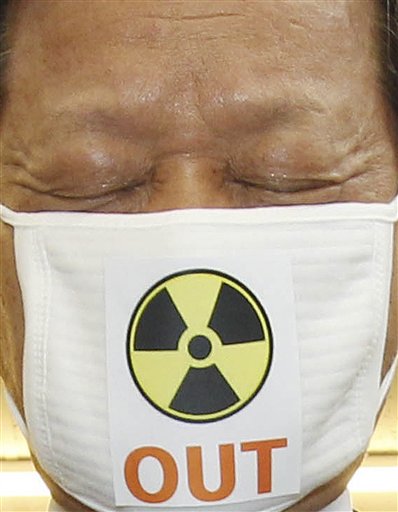 A South Korean environmentalist Choi Yul pays silent tribute to victims of earthquake and tsunami in Japan, during a press conference demanding South Korean government shut down nuclear facilities on South Korea, in Seoul, South Korea, Friday, March 18, 2011. Fears over possible radiation contamination are growing in South Korea, the country closest to Japan, after Japanese nuclear power plants were damaged by earthquakes last week. (AP Photo/Yonhap, Lee Jung-hoon)
A South Korean environmentalist Choi Yul pays silent tribute to victims of earthquake and tsunami in Japan, during a press conference demanding South Korean government shut down nuclear facilities on South Korea, in Seoul, South Korea, Friday, March 18, 2011. Fears over possible radiation contamination are growing in South Korea, the country closest to Japan, after Japanese nuclear power plants were damaged by earthquakes last week. (AP Photo/Yonhap, Lee Jung-hoon)FUKUSHIMA, Japan (AP) - Japan said radiation levels in spinach and milk from farms near its tsunami-crippled nuclear complex exceeded government safety limits, as emergency teams scrambled Saturday to restore power to the plant so it could cool dangerously overheated fuel.
The food was taken from farms as far as 65 miles (100 kilometers) from the stricken plants, suggesting a wide area of nuclear contamination.
The Japanese government also reports that trace amounts of radioactive iodine were detected in tap water in Tokyo and five other areas.
A government ministry reported Saturday that small amounts of the iodine was found in tap water in Tokyo and five other prefectures. The ministry says the amounts did not exceed government safety limits but usual tests show no iodine.
But the findings add to public concerns about radiation leaking from the Fukushima nuclear power plant crippled by the earthquake and tsunami.
While the radiation levels in spinach and milk exceeded the limits allowed by the government, Chief Cabinet Secretary Yukio Edano insisted the products "pose no immediate health risk."
The news of contaminated food came as Japan continued to grapple with the overwhelming consequences of the cascade of disasters unleashed by a 9.0-magnitude earthquake on March 11. The quake spawned a tsunami that ravaged Japan's northeastern coast, killing more than 7,300 people and knocking out backup cooling systems at the nuclear plant, which has been leaking radiation.
Nearly 11,000 people are still missing.
The tainted milk was found 20 miles (30 kilometers) from the plant, a local official said. The spinach was collected from six farms between 60 miles (100 kilometers) and 75 miles (120 kilometers) to the south of the reactors.
Those areas are rich farm country known for melons, rice and peaches, so the contamination could affect food supplies for large parts of Japan.
More testing was being done on other foods, Edano said in Tokyo, and if tests show further contamination then food shipments from the area would be halted.
Officials said it was too early to know if the nuclear crisis caused the contamination, but Edano said air sampling done near the dairy showed higher radiation levels.
Iodine levels in the spinach exceeded safety limits by three to seven times, a food safety official said. Tests on the milk done Wednesday detected small amounts of iodine 131 and cesium 137, the latter being a longer lasting element and can cause more types of cancer. But only iodine was detected Thursday and Friday, a Health Ministry official said.
Officials from Edano on down tried to calm public jitters, saying the amounts detected were so small that people would have to consume unimaginable amounts to endanger their health.
Edano said someone drinking the tainted milk for one year would consume as much radiation as in a CT scan; for the spinach, it would be one-fifth of a CT scan. A CT scan is a compressed series of X-rays used for medical tests.
"Can you imagine eating one kilogram of spinach every day for one year?" State Secretary of Health Minister Yoko Komiyama said. One kilogram is a little over two pounds.
